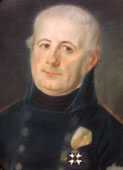Jonas Lidströmer

Jonas Lidströmer (1755–1808) was a Swedish inventor and officer in the Swedish navy. Lidströmer was born in 1755 at Lagfors bruk, Medelpad, and died 1808 in Stockholm.[1] Colonel-mecanicus, Head of the mechanical state of the Royal Swedish-Finnish Navy, Royal Inventor and adviser to the king, Knight of the order of Wasa and finally knighted Lidströmer (was previously called Lidström).
Biography
He was the son of inspector and co-owner of Lagfors bruk, Jonas Lidström the elder (born 1713), and began his studies at Uppsala University in spring 1771.
Jonas Lidströmer has often been called Sweden's "mechanical genius" and is often compared with Polhem, another great Swedish inventor. He collaborated with Fredrik Henrik af Chapman and came via him to Karlskrona, the main base of the Swedish navy at the time. He also collaborated with the artists Johan Tobias Sergel, Louis Jean Desprez and Ehrensvärd, and a letter corresondence with C.C. Gjörwell has been preserved. The later wellrenowned royal architect Fredrik Blom was the adept of Jonas Lidströmer.[2]
Perhaps he is mostly famous for the Obelisk at Slottsbacken adjacent to the Royal Palace in Stockholm and the construction of Norrbro (the bridge between the Royal Palace and the Opera in Stockholm, architect for the southern part, but leader for the construction of the northern as well). Jonas Lidströmer also erected the statue of king Gustav III, with its functional postament. He has also designed, constructed and built the famous Mast Crane at the Naval harbour of Karlskrona.[3]
Jonas Lidströmer also constructed series of harbours in Sweden and Finland, and improved the harbours of Gothenburg, Karlskrona and Helsingborg.[4]
He was the head of the Mechanical school in Karlskorna, the most qualified technical education at the time. He is behind a large number of mechanical devices and innovations, such as steel grinderies, chip docks, compasses etc.[5]
Jonas Lidströmer was the president of the Royal Swedish Academy of Sciences (of which he was a member from 1805), and member of several other academies such as the Royal Swedish Academy of Arts and the Royal Swedish Academy of War Sciences.[6] He was Knight of the Royal Order of Vasa. Several models and drawings of his work are present at a number of museums such as the Maritime Museum in Stockholm (Sjöhistoriska museet), the Architecture Museum in Stockholm (Arkitekturmuseum) and the Naval Museum in Karlskrona (Marinmuseum).[7]
He married Elisabeth Öhman and had six children. Two daughters and two sons survived to adulthood. His younger son Johan Nikolaus Lidströmer, who inherited the Allatorp property outside Karlskrona in Blekinge, had children, but no grandchildren. Jonas Lidströmer's oldest son Fredrik August Lidströmer (1787–1856) was Stockholm's City Architect and passed the name further to his oldest son Otto August Lidströmer, businessman in Stockholm, who also had a younger brother Fredrik Lidströmer who was commander (officer) at the former Swedish colony Saint Barthelemy in the Caribbean, who did however not have any children. Otto August Lidströmer alone passed the name further to his only son Gustaf Lidströmer (lawyer)(whose sister Sigrid Lidströmer didn't have any children), who in his turn passed it to his only child Jonas (II) Lidströmer (lawyer).[8]
Notes
- ↑ Gustaf Elgenstierna, Svenska adelns ättartaflor, 1920
- ↑ Fredrik Blom, Åminnelse-Tal öfver Kongl. Akademiens framl. Ledamot, öfvertse Löjtanten, Välborne Herr Jonas Lidströmer, Krigsvetenskapsakademiens Handlingar 1808-1809, pp. 37-58, Stockholm, 1811
- ↑ L. M. Bååth, Helgeandsholmen och Norrrström, vol. I-II, Stockholm, 1918
- ↑ Göteborgs eskader och örlogsstation 1523-1870, Gotenburg, 1949
- ↑ P.O. Nyström, Åminnelse-tal öfver Chefen för Kongl. örlogsflottans Mekaniska Stat, öfverstelöjtnanten och Riddaren av Kongl. Wasa Orden, Herr Jonas Lidströmer, Carlskrona, 1820.
- ↑ N. M. Lindh, Svenskt biografiskt lexikon, pp.. 217-220, örebro, 1865-68
- ↑ Svenskt biografiskt lexikon, pp. 733-735, Stockholm, 1977-1979
- ↑ Sveriges ridderskap och adels kalender, Stockholm, Edition 104, 2007. ISBN 91-631-9198-9
|